The SSD Anthology: Understanding SSDs and New Drives from OCZ
by Anand Lal Shimpi on March 18, 2009 12:00 AM EST- Posted in
- Storage
PCMark Vantage
Next up is PCMark Vantage, another system-wide performance suite. For those of you who aren’t familiar with PCMark Vantage, it ends up being the most real-world-like hard drive test I can come up with. It runs things like application launches, file searches, web browsing, contacts searching, video playback, photo editing and other completely mundane but real-world tasks. I’ve described the benchmark in great detail before but if you’d like to read up on what it does in particular, take a look at Futuremark’s whitepaper on the benchmark; it’s not perfect, but it’s good enough to be a member of a comprehensive storage benchmark suite. Any performance impacts here would most likely be reflected in the real world.
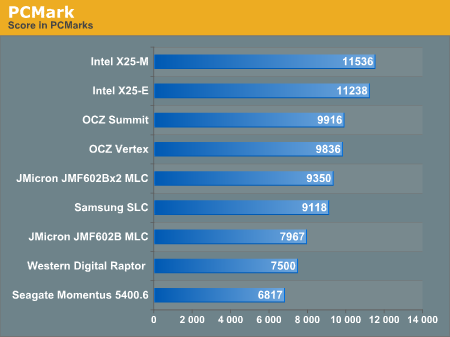
If you've paid attention to the synthetic tests from the previous pages, the results here should make sense. The Intel drives take the top two spots followed by the two OCZ drives, then the JMicron and conventional HDDs take up the rear.
While PCMark does do a great job of measuring disk performance, it doesn't seem to stress random write performance as much, allowing the JMicron drives to relax a bit.
Now let's look at the individual test suites:
The memories suite includes a test involving importing pictures into Windows Photo Gallery and editing them, a fairly benign task that easily falls into the category of being very influenced by disk performance.
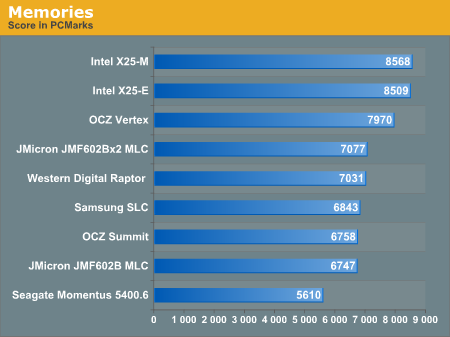
The TV and Movies tests focus on on video transcoding which is mostly CPU bound, but one of the tests involves Windows Media Center which tends to be disk bound.
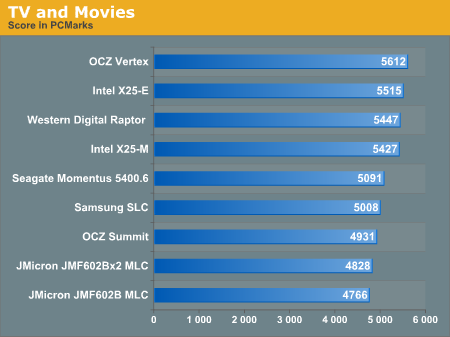
SSDs won't always dominate and in many cases they won't offer tangible improvements over a fast hard drive.
The gaming tests are very well suited to SSDs since they spend a good portion of their time focusing on reading textures and loading level data. All of the SSDs dominate here, but as you'll see later on in my gaming tests the benefits of an SSD really vary depending on the game. Take these results as a best case scenario of what can happen, not the norm.
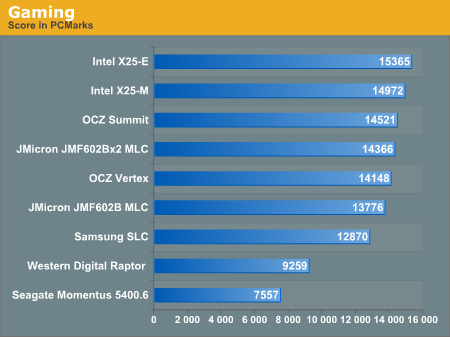
In the Music suite the main test is a multitasking scenario: the test simulates surfing the web in IE7, transcoding an audio file and adding music to Windows Media Player (the most disk intensive portion of the test).
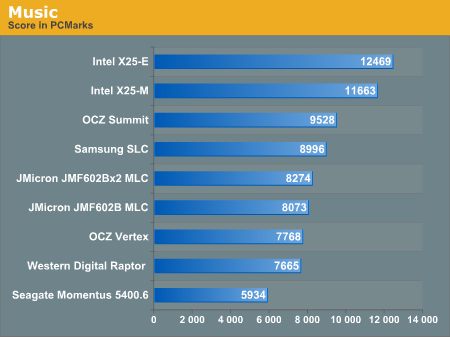
The Communications suite is made up of two tests, both involving light multitasking. The first test simulates data encryption/decryption while running message rules in Windows Mail. The second test simulates web surfing (including opening/closing tabs) in IE7, data decryption and running Windows Defender.

I love PCMark's Productivity test; in this test there are four tasks going on at once, searching through Windows contacts, searching through Windows Mail, browsing multiple webpages in IE7 and loading applications. This is as real world of a scenario as you get and it happens to be representative of one of the most frustrating HDD usage models - trying to do multiple things at once. There's nothing more annoying than trying to launch a simple application while you're doing other things in the background and have the load take seemingly forever.
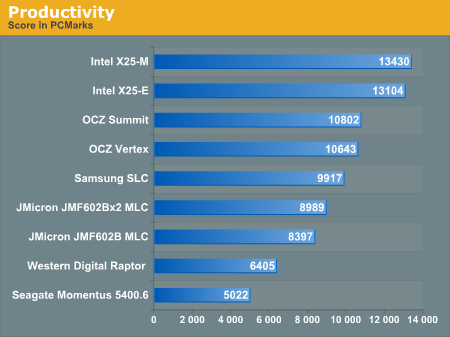
The results here are the best characterization of my personal experience with the drives. The Intel drives are the fastest, a good 25% faster than the Summit or Vertex. Next up are the OCZ drives, with the Vertex dangerously close to the Summit. The older Samsung SLC is next in the standings, followed by the JMicron drives. There's a healthy combination of reads and writes going on here which benefits all of the SSDs, including the less desirable ones.
The final PCMark Vantage suite is HDD specific and this is where you'll see the biggest differences between the drives:
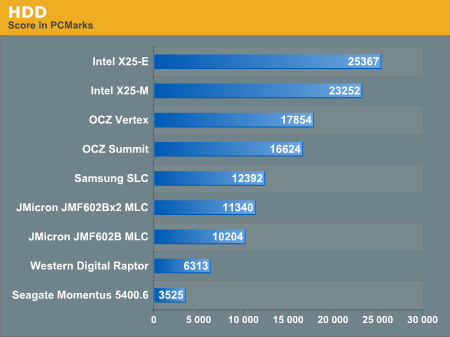
Again we're seeing the sort of breakdown we'd expect. The Intel drives come out ahead, while the Vertex is the best bang for your buck.










250 Comments
View All Comments
VaultDweller - Wednesday, March 18, 2009 - link
I love it when people critique someone's critique of grammar... and get it wrong.It's an SSD, not a SSD.
gwolfman - Wednesday, March 18, 2009 - link
lolzsidex - Wednesday, March 18, 2009 - link
I would like to know the firmware version of Vertex used in your review. To me sounds the old 0112kensiko - Wednesday, March 18, 2009 - link
Yes that is important to know.I'm sure this is not done with the latest firmware available which is 1199. This version got better performance.
Firmware 1275 is coming also.
Anand, will you update your benchmarks with the latest firmware?
If not, then the benchmarks are obsolete.
Anand Lal Shimpi - Wednesday, March 18, 2009 - link
I tested with the shipping firmware for this article (0122). I've been playing around with 1199 in the lab and will most likely have an update in a couple of weeks once I've done a thorough evaluation of it. By then I should also have the final version of the new Samsung drive and maybe even some other interesting things.For now, I've got to get to work on the new Mac Pro and the updated Ion article :) I need a small break from SSDs por favor :)
Take care,
Anand
VaultDweller - Wednesday, March 18, 2009 - link
Awww, don't you have some underlings to do your SSD-related will?Would love to see an update, and would love to see Corsair's SSD drive tested as well (it's based on Samsung's last generation MLC controller, and doesn't seem to emphasize sequential like the Summit does).
Anand Lal Shimpi - Wednesday, March 18, 2009 - link
I will do an update on the new firmware, I just want to do it right so it'll take some time :)I'll put in a request for the Corsair drive as well :)
-A
Slash3 - Wednesday, March 18, 2009 - link
Page 29: "Not all applications will launch faster than a VelociRaptor on a SSD, but let's not forget that the VelociRaptor is the world's fastest hard drive."Really? What about the nice and speedy enterprise-level 15k SAS/SCSI drives everyone neglects to acknowledge? :)
George Powell - Wednesday, March 18, 2009 - link
I believe it refers to consumer drives. While SAS drives are beginning to be a possibility on the desktop with newer motherboards supporting them natively, the drives themselves are too expensive and too noisy for most consumers to actually want them.FishTankX - Wednesday, March 18, 2009 - link
Good info. However, I noticed one mistake.Second page
Samsung had a MLC controller at the time but it was too expensive than what SuperTalent was shooting for.